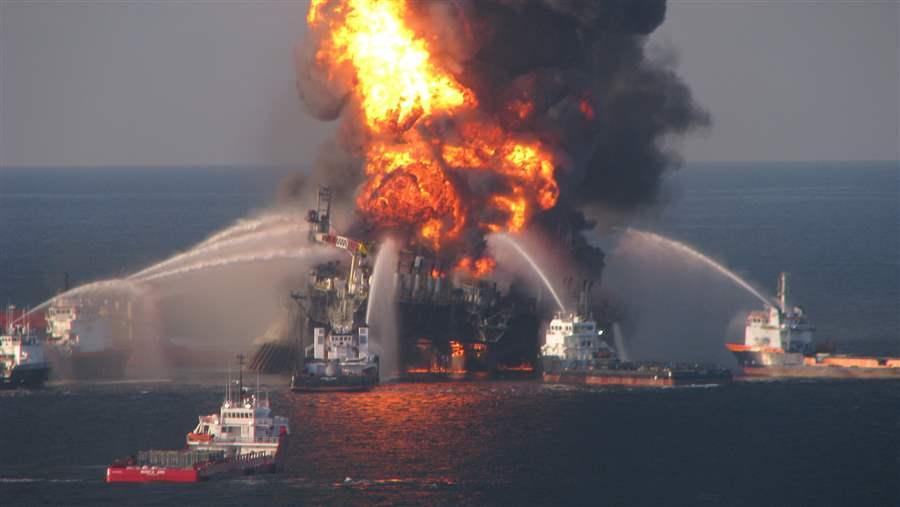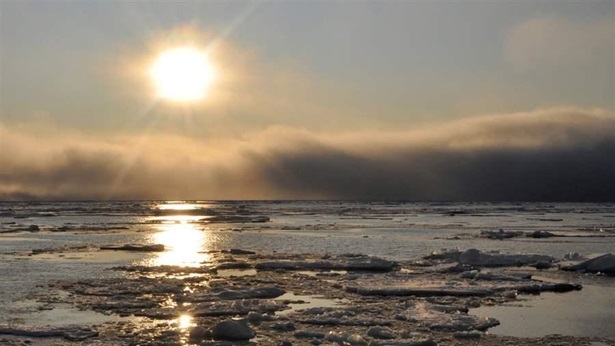BP Oil Spill Anniversary
For the one-year anniversary of the disaster, The Pew Charitable Trusts' U.S. Arctic Program invited a panel of experts to reflect, via a phone briefing, on the economic and environmental impacts of the spill, the recommendations of the National Oil Spill Commission and the challenges of spill prevention and response in the extreme, remote and fragile U.S. Arctic Ocean.
The panelists included U.A.A. Chancellor Fran Ulmer, Retired U.S. Coast Guard Admiral Thad Allen, Senate Energy Committee Staff Director Robert Simon, and Pew U.S. Arctic Director Marilyn Heiman. (More information on the panelists can be found below.)
Click here to access a recording of the briefing>
 © Photo courtesy of the US Coast Guard
© Photo courtesy of the US Coast GuardOil Rig "Deepwater Horizon" Fire
FROM THE BRIEFING
On April 20, 2010, the BP Deepwater Horizon oil rig exploded and caught fire, setting into motion the largest oil spill in the nation’s history. Eleven people died in the explosion. It took 87 days to cap the well. By then, almost 5 million barrels of oil had spilled into the Gulf of Mexico. The projected loss to Gulf tourism was estimated at more than $22 billion. It will be years before studies determine the true costs to wildlife, fisheries and the ecosystem.
Since the blowout, the Obama administration has made a lot of progress on safety regulations and agency reforms, but more needs to be done by both the administration and Congress. We also need more funding for agencies to conduct industry oversight, environmental monitoring, spill-response planning and research into spill-response technologies—including technologies that will work in the Arctic Ocean. As bad as the spill was in the Gulf, it could provefar more difficult to contain and control a spill in extreme Arctic conditions. There is no proven method for cleaning up oil in broken ice or in the high seas and high winds that are common in the Arctic. Simply getting equipment and trained personnel to an Arctic spill site would be challenging due to its remoteness.Because of this, we can’t count on flying or shipping equipment and personnel in. Shoreline and near-shore protection equipment, containment domes and relief well rigs need to be on site or nearby, not 1,300 miles away at the nearest major port. The same goes for personnel trained in how to use them. We must have in place the gold standard for safety and spill response.
ABOUT THE PANELISTS
Fran Ulmer is chancellor of Alaska’s largest public university, the University of Alaska Anchorage (UAA). Ms. Ulmer was appointed by President Barack Obama in March to a four-year term as chair of the U.S. Arctic Research Commission. In June 2010, President Obama appointed her to the National Commission on the BP Deepwater Horizon Oil Spill and Offshore Drilling. Prior to that appointment, she was a member of the Aspen Institute's Commission on Arctic Climate Change and held board positions with the Alaska Nature Conservancy, the National Parks Conservation Association and the Union of Concerned Scientists. Appointed Chancellor in 2007, Ms. Ulmer previously was a Distinguished Visiting Professor of Public Policy and Director of the Institute of Social and Economic Research at UAA. During her more than 30 years of work in public service on the local, state and national level, Ms. Ulmer has helped to shape both public and environmental policy. As a state legislator, Ms. Ulmer served on the Special Committee on the Exxon Valdez Oil Spill Claims Settlement. In addition, she was the first Chair of the Alaska Coastal Policy Council and served for more than 10 years on the North Pacific Anadromous Fish Commission. Ms. Ulmer served as an elected official for 18 years as the mayor of Juneau, a state representative and as Lieutenant Governor of Alaska. As Director of Policy Development for the State of Alaska, Ms. Ulmer managed diverse programs, including coastal management, intergovernmental coordination, and public participation initiatives. Ms. Ulmer earned a J.D. cum laude from the University of Wisconsin Law School, and has been a Fellow at the Institute of Politics at the Kennedy School of Government.
Contact Chancellor Ulmer or via Pam Cravez, Special Assistant to the Chancellor for Communications, (907) 786-1417
Admiral Thad W. Allen led the nation’s response to the Deepwater Horizon oil spill, first as commandant of the United States Coast Guard and then, at the request of President Obama, as the national incident commander. During his tenure as the top officer of the nation's oldest continuous sea service, Admiral Allen led the effort to reform and modernize all aspects of the Coast Guard. His ultimate aim was to make the Coast Guard a "change-centric" organization capable of quickly and efficiently adapting to meet the growing and ever-changing demands of the future. Admiral Allen led the service during a time when it responded to a number of significant national and international incidents, including the earthquake in Haiti, hurricanes, floods, search-and-rescue cases, oil spills and other environmental incidents. He led the effort to explore the changing Arctic, solidified the Coast Guard's relationships with the nation's other armed services and federal partners, and reached out to the private sector. Adm. Allen held many command posts during his Coast Guard career. He was the principal federal official overseeing Hurricane Katrina response and recovery efforts in the Gulf Coast region and commanded the Coast Guard's Atlantic forces in its response to the terrorist attacks of Sept. 11, 2001. Admiral Allen completed his four-year term as Commandant on May 25, 2010, and retired from the Coast Guard on June 30, 2010.
Admiral Allen can be reached through Pew, Mary Engel, (206) 491-3365 or Brandon MacGillis, (202) 887-8830.
Dr. Robert M. Simon is the Staff Director of the Committee on Energy and Natural Resources of the United States Senate. Dr. Simon’s primary role is to coordinate the process of developing new policies and passing legislation from the Committee. In the 109th Congress, he played a major role in the passage of the Energy Policy Act of 2005, the first comprehensive energy bill to become law in 13 years. In the following Congress, Bob again played a key role in helping shepherd the Energy Independence and Security Act of 2007 to enactment. Dr. Simon holds a doctorate degree from the Massachusetts Institute of Technology, and was recently elected a Fellow of the American Association for the Advancement of Science, the world’s largest general scientific society, for his contributions to integrating science with public policy.
Contact Bill Wicker or Rosemarie Calabro, or (202) 224-5243.
Marilyn Heiman is director of The Pew Charitable Trusts' U.S. Arctic campaigns. Prior to becoming the director, she was the campaign manager of the International Boreal Conservation Campaign, an international effort to protect the largest remaining forest ecosystems on Earth. She was appointed by Interior Secretary Bruce Babbitt as his top Alaska policy advisor. In that capacity she coordinated activities of the Bureau of Land Management, the former Minerals Management Service, National Park Service, the Bureau of Indian Affairs, the U.S. Fish and Wildlife Service and the U.S. Geological Survey for the Secretary in Alaska. As Alaska representative to the Department of the Interior, she served on the six-person Exxon Valdez Oil Spill Trustee Council. Prior to holding that position she served as special assistant on Natural Resources and Oceans to Governor Tony Knowles in Alaska and served as the director of his statewide transition team following his election in 1994. She worked as an aide to the House Resources Committee in the Alaska Legislature during the Exxon Valdez oil spill and has run several statewide electoral and policy campaigns in Alaska.
Contact Mary Engel, [email protected] 206.453.2372 or Brandon MacGillis, [email protected] (202) 887-8830.
About The Pew Charitable Trusts’ Environmental Initiatives
The aim of Pew’s environmental initiatives is to strengthen policies and practices in ways that produce significant and measurable protection for terrestrial and marine systems worldwide.




